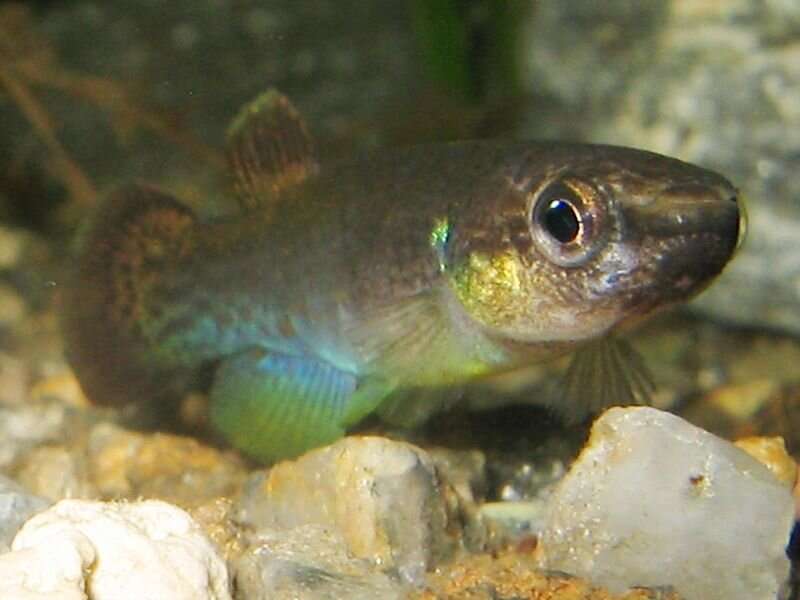
A pair of researchers at the University of Guelph has found that forcing mangrove rivulus fish to flip into the air regularly pushes them to develop more brain matter. In their paper published in Proceedings of the Royal Society B, Giulia Rossi and Patricia Wright describe experiments they conducted with the amphibious fish, what they learned about them and why they believe their findings shed light on the first creatures to migrate to land from the sea.
Mangrove rivulus fish look a little bit like goldfish born without fins—they are native to the coasts of the Antilles and Florida. What makes them unique is their ability to flip themselves out of the water onto shore where they live on land for up to weeks at a time—they are able to do so by breathing through their skin. In this new effort, Rossi and Wright wondered if flipping themselves into a terrestrial environment might have an impact on their brains.
To find out, they conducted an experiment that consisted of capturing several of the fish and putting them in different environments. One group lived in a bowl filled with water for two months. Another lived in a bowl where the water was drained every few days—and the third group lived in a bowl of water but were pulled out a few times a week and set on a dry surface. Each was then poked with a pen to make it jump for three minutes.
After two months, half of the fish from each bowl were removed from their environments and had their brains dissected. After studying the brains of all the fish, the researchers found that those that had been forced to jump regularly experienced growth spurts in their dorsolateral pallium—a part of the fish brain involved in navigating new environments. The researchers then tested the other group by putting them in an underwater maze—working their way through it led to a tasty treat. The researchers found that the fish that had been prodded into jumping and the fish that had their water drained periodically did better than the fish in the water-only bowl.
The researchers suggest their work hints at the possibility of an ancient sea creature developing a more sophisticated brain after jumping or crawling onto the shore—laying the groundwork for the development of terrestrial animals.
© 2021 Science X Network
Citation: Study of mangrove rivulus fish hints at mechanism for brain evolution of land animals (2021, June 16) retrieved 16 June 2021 from https://ift.tt/3gT6CxR
This document is subject to copyright. Apart from any fair dealing for the purpose of private study or research, no part may be reproduced without the written permission. The content is provided for information purposes only.
"fish" - Google News
June 16, 2021 at 08:07PM
https://ift.tt/3gT6CxR
Study of mangrove rivulus fish hints at mechanism for brain evolution of land animals - Phys.org
"fish" - Google News
https://ift.tt/35JkYuc
https://ift.tt/3feFffJ
Bagikan Berita Ini














0 Response to "Study of mangrove rivulus fish hints at mechanism for brain evolution of land animals - Phys.org"
Post a Comment